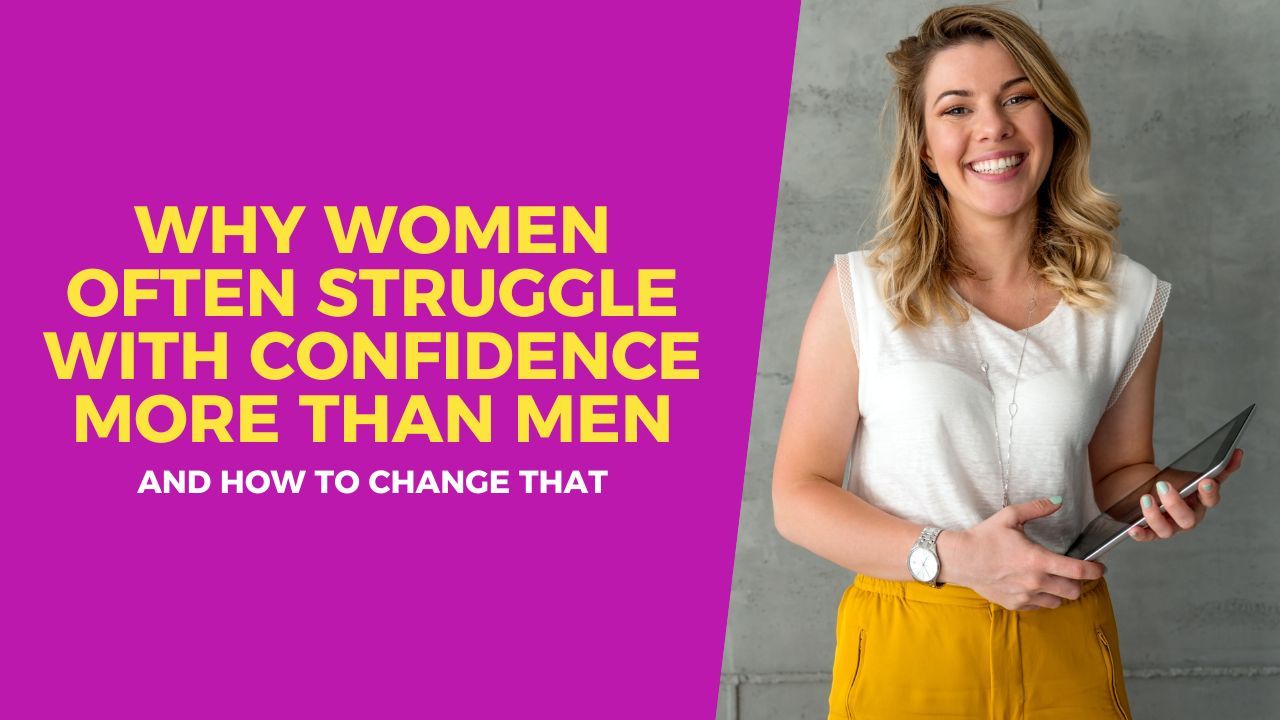Why Women Often Struggle With Confidence More Than Men (And How to Change That)
Jun 03, 2025
You’re Smart. You’re Skilled. So Why Don’t You Feel as Confident as You’d Like?
You’ve got the qualifications. You’ve got the experience. You know your stuff.
But when it’s time to speak up in a meeting, ask for the raise, take the lead, or go after the next-level opportunity, you hesitate. You overthink. You tell yourself, I just need a little more time, more training, more proof that I’m ready.
Meanwhile, your male colleague, who may or may not have half your qualifications, walks in like he invented confidence.
What gives?
It’s not you. It’s the system.
Women’s confidence struggles aren’t just about mindset, they’re about how many systems in society have been created, hardwired differences, social conditioning, and how we’ve been taught to “play nice” instead of playing big.
But here’s the good news: Confidence isn’t something you’re born with. It’s something you build. And once you understand what’s really holding you back, you can flip the script and start showing up like the powerhouse you are.
Here’s what we’re covering today:
Why the confidence gap exists (and why it’s NOT your fault)
How science and social conditioning stack the deck against women
The strategies to unlearn confidence blockers and start owning the room
Why confidence isn’t a personality trait—it’s a skill (and how to train it like one)
Ready to rewrite the rules? Let’s go.
The Confidence Gap Is Real (And It’s Not Your Fault)
Let’s start with the data:
Studies show that women consistently underestimate their abilities, while men overestimate theirs. (Source: Harvard Business Review)
Men apply for jobs when they meet just 50-60% of the qualifications. Women? We wait until we hit 100%. (Source: Harvard Business Review)
Confidence, not competence, is what drives success. In leadership, promotions, and even negotiations, those who appear more confident get ahead, regardless of actual skill level.
So if you’ve ever felt like you’re just not as naturally confident as men, guess what?
It’s not because you lack confidence, it’s because you’ve been conditioned to doubt yourself.
The Confidence-Competence Disconnect
One of the biggest challenges women face is the confidence-competence disconnect.
Men act as if they’re ready, even when they aren’t.
Women wait until they’re completely ready, even when they already are.
It’s not because men are naturally more confident. It’s because they’ve been encouraged to take risks, while women have been trained to be “good” and not make a mess.
How Society Conditions Women to Play Small
From a young age, girls are:
Praised for being polite, accommodating, and agreeable → Confidence often gets labeled as "bossy" or "too much."
Taught to be perfectionists → Instead of taking risks, we aim to "get it right."
Encouraged to be helpers, not leaders → Women are expected to support others rather than take center stage.
Meanwhile, boys are encouraged to:
Take risks and fail fast → Failure is a lesson, not a dealbreaker.
Speak up, even when they’re unsure → They’re rewarded for confidence, not just correctness.
Assert themselves without apology → No one questions if they’re “too much.”
By the time we enter the workforce, the damage is done: We’ve internalized the idea that we have to be perfect, liked, and 100% ready before we take action.
And that’s where the confidence gap is born.
Science & Social Conditioning: The Double Bind That Holds Women Back
The Likability vs. Competence Trap
When men assert themselves, they’re seen as leaders.
When women assert themselves, they’re often seen as aggressive, bossy, or difficult.
This is called the double bind and it forces women to walk a tightrope between being:
-
Competent, but "cold"
-
Likable, but "not strong enough"
A study from Columbia Business School found that the more confident and assertive a woman is, the less likable she is perceived to be. Meanwhile, men’s likability increases when they display confidence.
Translation? Women are penalized for the very traits that help men succeed. If a woman speaks up, she risks being labeled “too much.” If she doesn’t, she risks being overlooked.
Biology Plays a Role, But It’s Not the Whole Story
Science shows that women’s brains process risk differently than men’s.
Women are more likely to weigh all possible outcomes before making a decision.
Men are more likely to act first and assess risks later.
This happens because women's brains have a larger and more active prefrontal cortex, which is responsible for planning, impulse control, and weighing consequences—leading to a more thoughtful, risk-aware decision-making process compared to men, who tend to have a more action-oriented, reward-driven response due to differences in the limbic system and dopamine pathways.
It’s not that women aren’t confident, it’s that our brains are wired to evaluate more before taking action. Women tend to make calculated, strategic decisions rather than impulsive ones. But when this biological trait collides with social conditioning that tells us to be perfect, cautious, and likable, it turns into a confidence blocker, one that keeps us from taking action as quickly or boldly as men.
The solution? Recognizing these patterns and actively rewiring the mindset that holds us back.
How to Retrain Your Brain for Confidence
The good news? Confidence is more of a skill than a personality trait.
You don’t need to wait for it, you need to train it.
Here’s how to start building it right now:
1. Rewrite Your Inner Narrative
Confidence isn’t about feeling ready—it’s about acting before you do.
Instead of “I need to be 100% ready first.”
Try “I am learning as I go, and that’s enough.”
Instead of “What if I fail?”
Try “What if I succeed?”
Instead of “I don’t want to come off too strong.”
Try “I have valuable ideas that deserve to be heard.”
Your thoughts shape your reality. Change your words, and you’ll change your confidence.
2. Play It Out
Ask yourself:
-
What would I do if I had nothing to prove?
-
What would I do if I knew I couldn’t fail?
Then do exactly that. When you remove the mental barriers of self-doubt, your true potential comes into focus.
3. Reframe Risk
Women are taught to fear failure. But here’s the truth:
-
The worst-case scenario is almost never as bad as you think.
-
The best-case scenario? It’s life-changing.
Next time self-doubt creeps in, ask yourself:
-
What’s actually at risk?
-
What’s the worst that could happen?
-
And what’s the best?
Most of the time, the upside far outweighs the downside, and you’re overestimating the risk.
4. Micro Wins = Macro Confidence
Confidence isn’t a switch, it’s a muscle you strengthen with action.
Start small:
-
Speak up once in a meeting.
-
Send the email before you overthink it.
-
Ask for the raise, even if it feels scary.
Each small act of courage builds momentum, until confidence becomes your default setting.
5. Surround Yourself with Confident Women
Confidence is contagious. Being in rooms where women own it makes it easier for you to do the same.
Find a community that pushes you higher. (P.S. That’s exactly what we do inside Soul on Fire.)
Because the fastest way to build confidence? Be around women who already have it and who remind you that you do, too.
Why Confidence Is a Skill, Not a Trait
Here’s the secret: Confident people aren’t necessarily born that way, they built it. And so can you.
Confidence isn’t something you either have or don’t, it’s a skill developed through repetition and experience. Think of it like a muscle: the more you use it, the stronger it gets. Every time you step outside your comfort zone, whether it’s speaking up in a meeting, making a bold decision, or standing firm in your opinions, you’re reinforcing the belief that you can handle challenges.
Confidence isn’t about being fearless, it’s about acting despite fear. Fear doesn’t disappear, but confident people don’t let it stop them. Instead, they take action before they feel ready.
The only way to build confidence is through proof, by showing yourself, again and again, that you are capable. The discomfort of trying something new is temporary, but the confidence you gain lasts.
So stop waiting for the perfect moment, step up now. The only way to believe in yourself is to give yourself reasons to. Take the step. You’ve got this.
Final Call to Action: Build Confidence That Lasts
If you’re tired of waiting, overthinking, and playing small, it’s time to rewrite the script.
Inside my Soul on Fire high-performance group coaching, mastermind and community, we don’t just talk about confidence, we train it.
Because confidence grows faster when you’re surrounded by women who refuse to shrink.
Ready to own your power? Join us inside Soul on Fire today.


